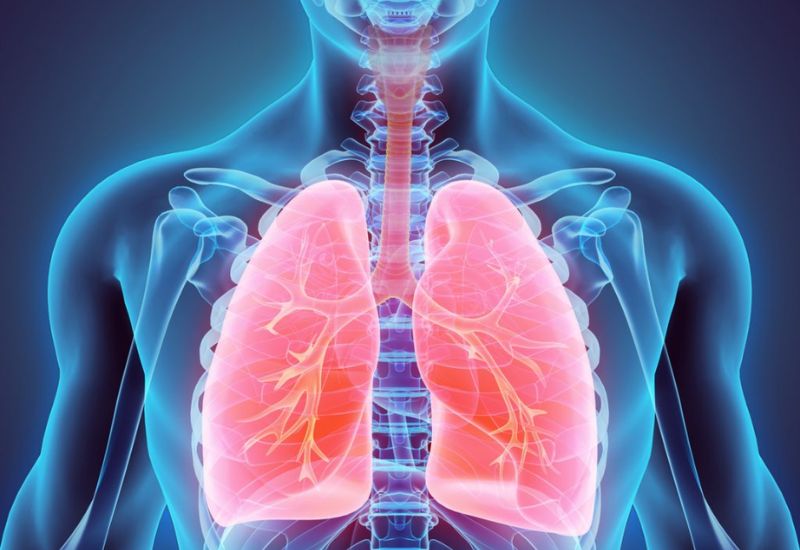Since the COVID-19 pandemic, respiratory health has become a priority for many. As seasons change, common respiratory symptoms such as dry cough, phlegm buildup, sore throat, sneezing, runny nose, fever, and body aches can easily emerge, impacting one’s overall well-being. Engaging in regular exercise for respiratory health can significantly enhance the body’s defenses, improving resilience against environmental pathogens and respiratory irritants.
1. Benefits of Exercise for Respiratory Health
Exercise for respiratory health has been shown to deliver substantial benefits. By engaging in physical activity, the body uses energy, improves blood circulation, and enhances oxygen flow. This increases the lungs’ ability to absorb oxygen, eliminates carbon dioxide, and helps flush toxins out of the body, all of which support overall respiratory efficiency.

Exercise is a vital method for improving respiratory health.
Maintaining a regular exercise routine brings numerous advantages to respiratory health, including:
1.1 Improving Lung Airflow
Exercise, regardless of intensity, enhances lung volume, which enables tissues to efficiently utilize oxygen during both physical exertion and rest. Researchers have found that physical activity strengthens respiratory muscles, increases chest flexibility, and improves lung blood flow by influencing pulmonary blood vessels. This collectively raises lung capacity and oxygen intake, supporting a healthier respiratory function.
1.2 Enhancing Respiratory Function
Regular exercise increases pulmonary ventilation, which enhances breathing capacity and minimizes breathing difficulties. This can reduce common respiratory symptoms, such as shortness of breath and cough. Furthermore, exercise bolsters heart chamber volume, thickens heart walls, boosts blood circulation, and raises hemoglobin levels, thus increasing cardiac output and optimizing respiratory function.
1.3 Strengthening Immunity and Lowering Infection Risks
Studies have shown that moderate to high-intensity physical activity can increase the production of neutrophils, mobilize lymphocytes, activate natural killer cells, stimulate macrophages, and eliminate harmful pathogens and tumor cells. These factors fortify the immune barrier, lowering susceptibility to infections.
However, it’s important to note that excessive strenuous activity can have the opposite effect, weakening the immune system and making the respiratory lining more vulnerable to infections. Finding the right exercise type and intensity is essential to reaping the benefits of exercise for respiratory health without compromising it.
2. Recommended Exercises for Respiratory Health
The CDC recommends at least 30 minutes of physical activity five days a week to improve overall health, including respiratory health. Here are some beneficial exercises:
2.1 Breathing Exercises
Breathing exercises are a simple yet effective way to promote respiratory health. Practicing controlled breathing can be done anywhere, stimulating nitric oxide (NO) production in the respiratory system to inhibit viral replication. Common breathing exercises that support respiratory health include:
– Humming Bee Breath: Inhale deeply and exhale slowly, producing a hum. This vibration, resembling a bee’s sound, should be sustained as long as comfortably possible. Perform this exercise for 8–10 repetitions daily, for 10–15 minutes.
– Stretch and Yawn Breathing: Start with a deep breath, stretching arms wide and opening the mouth. Exhale slowly with a slight smile. Repeat for 10–15 minutes, 3–6 times a day.
– Diaphragmatic Breathing: Place one hand on the chest and the other on the abdomen. Focus on deep inhalation and exhalation so the abdomen rises, strengthening the diaphragm. Perform this for 5–10 minutes, three times a day.
– Deep Breathing: Inhale deeply, pause for 1–2 seconds, and exhale fully. Practicing this occasionally can improve oxygen exchange in the lungs.

Diaphragmatic breathing can help control breathing effectively.
2.2 Jogging or Brisk Walking
Jogging or brisk walking benefits nearly everyone and gradually improves respiratory health. This exercise demands rhythmic breathing coordination, promoting lung efficiency and overall stamina. Aim for 30 minutes a day, at least 3–4 times per week, to observe noticeable respiratory improvements. Remember to exercise in warm weather, as cold air may exacerbate respiratory symptoms.
2.3 Swimming
Swimming is particularly advantageous for individuals with asthma, as it allows inhalation of humid air, which can ease respiratory passage irritation. The water pressure on the chest promotes deeper breathing, effectively enhancing lung capacity and respiratory endurance.

Swimming enhances respiratory health.
2.4 Yoga for Respiratory Health
Yoga breathing exercises help clear the airways, support deeper breathing, and reduce respiratory conditions like asthma and sinusitis. Key yoga breathing techniques include:
– Nadi Shodhana: This involves alternating nostril breathing with the thumb pressing each nostril in turn.
– Kapalbhati: This technique involves rapid exhalations followed by natural inhalations, expelling air quickly.
– Bhastrika: Inhale and exhale rapidly to generate sound, imitating a long sigh.
– Ujjayi: This technique requires inhaling and exhaling through the nose, creating a sound similar to ocean waves.
– Sheetali: Focus on slow inhalation through the mouth and gentle exhalation through the nose.
3. Exercise Considerations for Optimal Respiratory Health Benefits
Exercise for respiratory health can provide numerous advantages, but maximizing benefits requires attention to specific factors:
– For Healthy Individuals: Engage in enjoyable physical activities. However, if symptoms such as shortness of breath or chest pain appear, stop exercising and consult a physician.
– For Those with Respiratory Conditions: Conditions like chronic bronchitis, asthma, and chronic obstructive pulmonary disease (COPD) require choosing suitable sports and avoiding overly strenuous activities.
– General Precautions: Always warm up before beginning any exercise. If feeling fatigued, reduce intensity or take breaks. Exercise in well-ventilated environments, and avoid outdoor activities on days with high pollution levels.
– Lifestyle Balance: A balanced diet, personal hygiene, and reduced exposure to crowded places during outbreaks also play a role in respiratory health. Vaccination should be followed per medical guidance.
In conclusion, incorporating regular exercise for respiratory health is an effective way to strengthen respiratory function and build immunity. By choosing appropriate exercises, staying consistent, and combining this with preventive measures, you can maintain resilient respiratory health and overall well-being.








